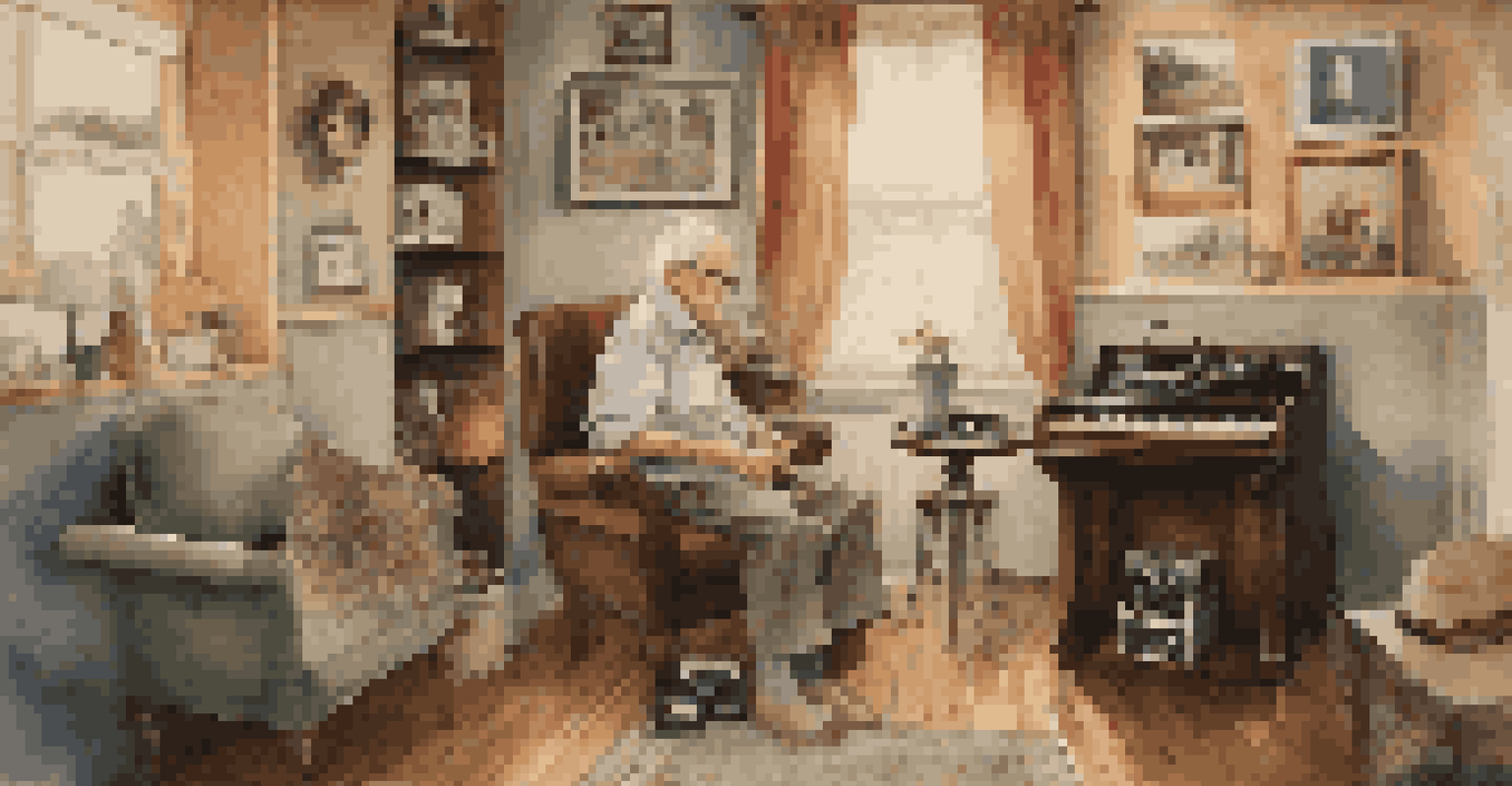The Sound of Memories: How Music Shapes Our Reminiscence

The Powerful Connection Between Music and Memory
Music has a unique ability to transport us back in time, evoking vivid memories. This connection stems from how our brains process music and emotions, intertwining them in a way that few other stimuli can. For example, hearing a song from your high school days can instantly remind you of friends, crushes, and experiences tied to that period.
Music can change the world because it can change people.
Studies have shown that music activates multiple areas of the brain, including those responsible for memory and emotion. This activation creates a rich tapestry of associations that can be recalled long after the music has stopped playing. So, when you hear that familiar tune, it's not just sound—it's a journey back to cherished moments.
This phenomenon is often referred to as the 'reminiscence bump,' where specific songs or melodies trigger a surge of nostalgia. This effect can be so strong that it even helps people with memory disorders, like Alzheimer's, recall significant moments from their past when they hear certain songs.
How Personal Experiences Shape Musical Memories
Our individual experiences play a significant role in how music shapes our memories. A song can be a soundtrack to a pivotal life event—like your first dance at a wedding or a road trip with friends. These personal associations create a rich emotional context that makes the music unforgettable.

For instance, if you heard a particular song during a moment of joy or sadness, that emotional connection will likely be triggered whenever you hear it again. This is why certain songs can bring tears to our eyes or make us smile, even years later. It's as if the music acts as a time capsule, preserving those feelings for us.
Music Evokes Powerful Memories
Music has a unique ability to trigger vivid memories and emotions, creating a rich tapestry of associations that can transport us back in time.
Moreover, the people we share musical experiences with also influence our memories. Listening to a song with a loved one can create a bond that enhances the emotional weight of that music, making it even more significant in our personal history.
The Science Behind Music and Memory Recall
Research in neuroscience reveals that music can enhance our ability to recall memories. When we listen to music, our brains release dopamine—a chemical associated with pleasure—which can heighten our emotional responses. This emotional boost often leads to stronger memory formation.
The music you listen to becomes the soundtrack of your life.
Additionally, music can serve as a cue for memory recall. For example, if you associate a particular song with a study session, hearing it again can prompt memories of the information you learned. This principle is utilized in therapeutic settings to aid individuals in recovering lost memories.
Understanding the science behind this connection helps us appreciate the therapeutic potential of music. By tapping into our musical memories, we can not only revisit the past but also improve our emotional well-being.
Nostalgia: The Emotional Anchor of Our Musical Memories
Nostalgia plays a crucial role in how we connect music to our memories. It’s that bittersweet feeling we get when we reminisce about the past—often triggered by a favorite song. This emotional state can make us feel connected to our roots and the experiences that have shaped who we are.
Songs can evoke nostalgia by reminding us of specific times, places, and people. This emotional pull can be both comforting and painful, as it highlights what we've lost or cherished. The beauty of this nostalgia lies in its ability to bring warmth to our memories, even when they involve bittersweet moments.
Personal Experiences Shape Nostalgia
Our individual experiences with music, such as shared moments or significant life events, enhance the emotional weight of songs and make them unforgettable.
Moreover, nostalgia can foster a sense of continuity in our lives, linking our present selves to our past experiences through music. This continuity can provide reassurance and a sense of identity, making music an essential part of our life journey.
Music as a Tool for Healing and Memory Recovery
Music therapy has emerged as a powerful tool in helping individuals recover memories and emotions, especially in those with cognitive impairments. By engaging with familiar tunes, patients often show improvements in memory recall and emotional responses. This approach highlights music's role as a bridge to the past, facilitating connections that might otherwise remain lost.
For example, caregivers often use music to help engage patients with Alzheimer's, allowing them to tap into memories that may not be readily accessible. The joy and comfort that music brings can create moments of clarity and connection, both for the patient and their loved ones.
Beyond cognitive recovery, music can also aid emotional healing. Many people find solace in music during tough times, as certain songs resonate with their personal struggles or triumphs, providing a sense of community and understanding.
The Role of Cultural and Social Contexts in Musical Memories
Cultural and social contexts heavily influence our musical memories. Different genres, styles, and traditions often carry unique emotional weights based on our backgrounds. For instance, a traditional song from your culture can evoke feelings of belonging and identity, enhancing the memories associated with it.
Moreover, music often serves as a social glue, bringing people together during celebrations, rituals, or gatherings. These shared experiences create collective memories that strengthen our connections to both music and each other. Think of how a national anthem can evoke pride during a sports event—it's music tied to shared emotions and experiences.
Music Aids Healing and Recall
Music therapy is an effective tool for helping individuals recover memories and emotions, especially in those with cognitive impairments like Alzheimer's.
By understanding these contexts, we can appreciate how music transcends individual experiences, becoming a powerful communal force that shapes our collective memories.
Creating New Memories Through Music in Everyday Life
Every day presents an opportunity to create new memories through music. Whether it’s a spontaneous dance party in your living room or a heartfelt sing-along during a road trip, these moments can become cherished memories. The key is to be present and fully engage with the music and the people around you.
Additionally, curating playlists for special occasions can enhance the memory-making process. By selecting songs that resonate with the theme of the event, you can create a soundtrack that enhances the emotional experience and solidifies those memories for years to come.

Ultimately, the music we choose to surround ourselves with plays a significant role in shaping our memories. By being intentional about our musical experiences, we can foster deeper connections with ourselves and others, enriching our lives with moments that resonate long after the music fades.